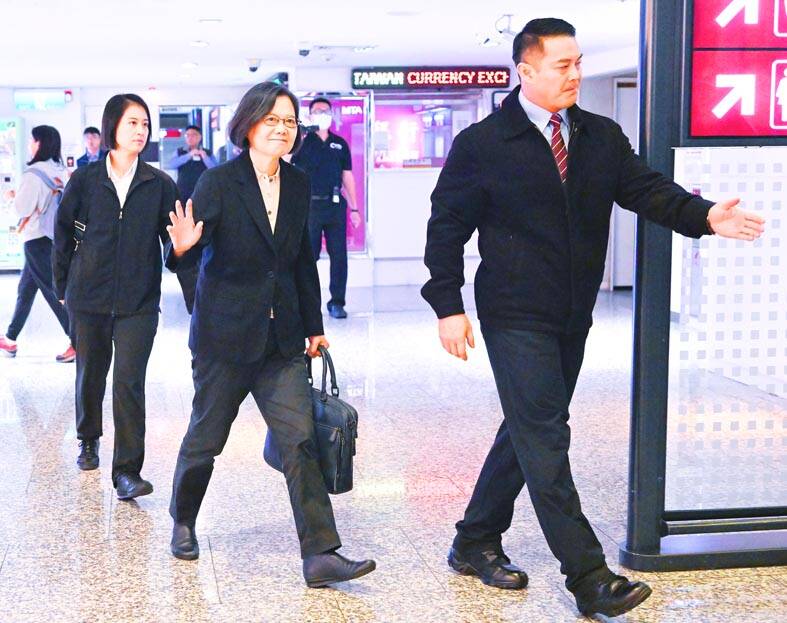Former president Tsai Ing-wen (蔡英文) plans to visit Canada next week, two diplomatic sources said.
Tsai, whose second term ended in May, is to visit Nova Scotia and deliver a speech at the Halifax International Security Forum, which begins on Friday next week, two diplomatic sources told Reuters, speaking on condition of anonymity given the sensitivity of the matter.
Tsai’s office said that if details of travel plans are confirmed, it would announce them at an appropriate time. It did not elaborate.

Photo: Chu Pei-hsiung, Taipei Times
Neither the Halifax Forum nor Canada’s Global Affairs department had responded to requests for comment sent outside of Canadian office hours.
The Chinese Ministry of Foreign Affairs also did not immediately respond to a request for comment.
Canada has a difficult relationship with China, including accusations by Ottawa about Chinese hacking attacks that Beijing denies, and disputes over human rights and trade.
Tsai’s travel plans to Canada and the forum were first reported by Taiwanese media.
Tsai last month visited the Czech Republic, France and Belgium in a sensitive trip due to concerns about Chinese espionage and harassment.
President William Lai (賴清德) fully supported her European visit, calling her the “best spokesperson” for the nation on the international stage.
Under Tsai’s watch, the government greatly boosted military investment and deepened unofficial relations with major countries including the US and Japan.
Meanwhile, a national security official yesterday declined to confirm media reports that Lai was planning a trip to Taiwan’s South Pacific allies with a stopover in Hawaii as soon as late this month.
The official, who spoke on condition of anonymity, said that the planning of the president’s overseas visits “proceeds according to the original pace” and that “there will be no surprise.”
Any such visit would be “announced when the time is ripe,” they said.
Chinese-language media have reported that Lai was planning to visit the South Pacific late this month or early next month, and would stop over in Hawaii.
Taiwan has 12 diplomatic allies, three of which are in the South Pacific: Palau, Tuvalu and the Marshall Islands.
Speculation about Lai embarking on his overseas visit after taking office in May circulated intermittently for months, with the Presidential Office responding only that “any such arrangements will be reported to the public in due time.”
Despite a lack of formal diplomatic relations, Washington has allowed Taiwanese presidents to make stopovers on US soil during their trips to visit Taiwan’s diplomatic allies.
How they were received in the US was often interpreted by the media as a sign of how Washington wanted to handle its relations with Taipei.
Tsai traveled to allies in the South Pacific twice during her two four-year tenures, in 2017 and 2019.
Her 2017 trip included layovers in Honolulu, Hawaii and Guam.

CHAOS: Iranians took to the streets playing celebratory music after reports of Khamenei’s death on Saturday, while mourners also gathered in Tehran yesterday Iranian Supreme Leader Ayatollah Ali Khamenei was killed in a major attack on Iran launched by Israel and the US, throwing the future of the Islamic republic into doubt and raising the risk of regional instability. Iranian state television and the state-run IRNA news agency announced the 86-year-old’s death early yesterday. US President Donald Trump said it gave Iranians their “greatest chance” to “take back” their country. The announcements came after a joint US and Israeli aerial bombardment that targeted Iranian military and governmental sites. Trump said the “heavy and pinpoint bombing” would continue through the week or as long

TRUST: The KMT said it respected the US’ timing and considerations, and hoped it would continue to honor its commitments to helping Taiwan bolster its defenses and deterrence US President Donald Trump is delaying a multibillion-dollar arms sale to Taiwan to ensure his visit to Beijing is successful, a New York Times report said. The weapons sales package has stalled in the US Department of State, the report said, citing US officials it did not identify. The White House has told agencies not to push forward ahead of Trump’s meeting with Chinese President Xi Jinping (習近平), it said. The two last month held a phone call to discuss trade and geopolitical flashpoints ahead of the summit. Xi raised the Taiwan issue and urged the US to handle arms sales to

A magnitude 5.6 earthquake struck off the coast of Yilan County at 12:37pm today, with clear shaking felt across much of northern Taiwan. There were no immediate reports of damage. The epicenter of the quake was 16.9km east-southeast of Yilan County Hall offshore at a depth of 66.8km, Central Weather Administration (CWA) data showed. The maximum intensity registered at a 4 in Yilan County’s Nanao Township (南澳) on Taiwan’s seven-tier scale. Other parts of Yilan, as well as certain areas of Hualien County, Taipei, New Taipei City, Taoyuan, Hsinchu County, Taichung and Miaoli County, recorded intensities of 3. Residents of Yilan County and Taipei received

Taiwan has secured another breakthrough in fruit exports, with jujubes, dragon fruit and lychees approved for shipment to the EU, the Ministry of Agriculture said yesterday. The Animal and Plant Health Inspection Agency on Thursday received formal notification of the approval from the EU, the ministry said, adding that the decision was expected to expand Taiwanese fruit producers’ access to high-end European markets. Taiwan exported 126 tonnes of lychees last year, valued at US$1.48 million, with Japan accounting for 102 tonnes. Other export destinations included New Zealand, Hong Kong, the US and Australia, ministry data showed. Jujube exports totaled 103 tonnes, valued at